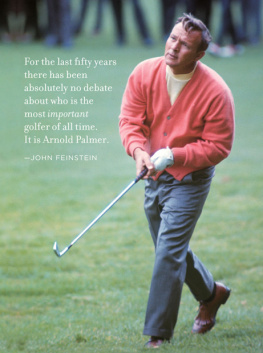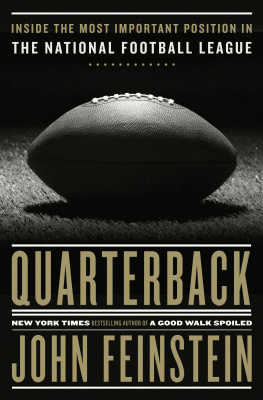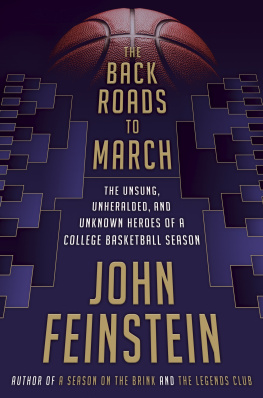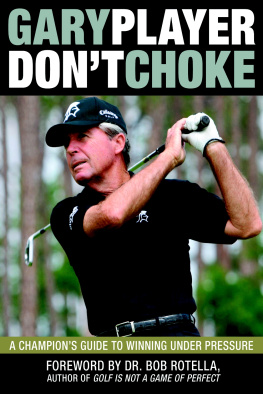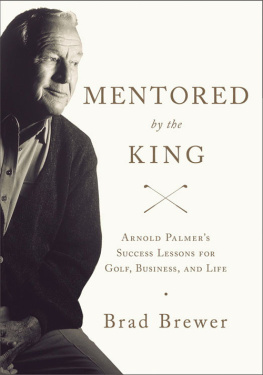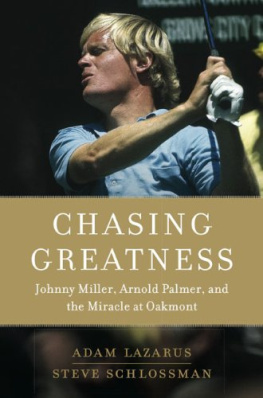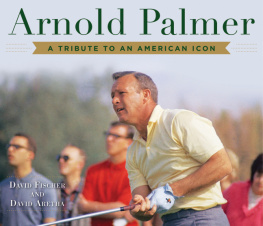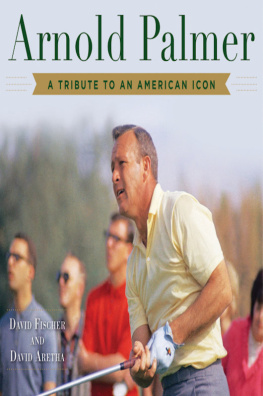In The Classic Palmer, renowned sportswriter John Feinstein provides a vivid biographical portrait of golfs beloved living icon, Arnold Palmer. From the moment he stepped into the spotlight, Arnold Palmer captured the loyalty of the nation. Over a more than fiftyyear career, Palmer amassed a truly impressive record: ninety-two worldwide titles, four Masters championships, a U.S. Open crown, and back-to-back British Open victories. This moving tribute, with a deeply personal essay by Feinstein and stunning photos by Walter Iooss, is a must-have keepsake for any golf fan.
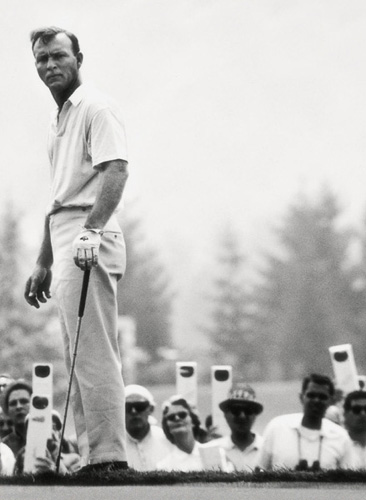

U.S. Open, Baltusrol Golf Club, Springfield, NJ, June 1967

Bing Crosby National Pro-Am, Pebble Beach Golf Links, Pebble Beach, CA, January 1966

There are many different ways to describe the manner in which an athlete dominates his sport. There are statistics and records and videotapes that can document ones accomplishments. There are paeans written and film tributes produced and awards presented. There are Halls of Fame to be inducted into and lifetime achievement plaques to be received.
Many athletes deserveand receiveall these honors.
But the list of athletes for whom the rules of an entire sport have been changed is a short one.
When Babe Ruth hit more home runs in an entire season than the rest of the American League, baseball decided it needed a livelier ball to give other hitters a chance to compete with the Babe. When Lew Alcindor played college basketball at UCLA in the 1960s, the dunk was outlawed to give defenders some chance to stop the unstoppable center.
And then there is Arnold Daniel Palmer. In 1980, both the United States Golf Association and the PGA Tour believed there was a market for a golf tour for players who were no longer at their peak physically but could still play the game well and appealed to fans. There was just one problem: the player who defined that sort of appeal and charisma had just turned fifty, and USGA rules defined a senior player as someone who was fifty-five or older.
If fans were going to buy tickets for senior golf or watch it on television, if corporations were going to put up sponsorship money, Arnold Palmer had to be out there playing. It was very simple: without Palmer there would be no Senior PGA Tour. If there was any doubt about that, it vanished after the first U.S. Senior Open was played on the East Course at the famed Winged Foot Golf Club in 1980.
We had crowds into the dozensmaybe, said David Fay, who was executive director of the USGA for twenty-one years but was at that time assistant executive director. We had good players in the field, and it was a wonderful golf course. But we didnt have Palmer.
Waiting until Palmer turned fifty-five was not an option if there was going to be a Senior Tour. Thus, the USGA declared, in its wisdom, that professionals (not amateurs) were deemed seniors the day they turned fifty.
A year later we had the Senior Open at Oakland Hills, and Arnie beat Billy Casper and Bob Stone in a Monday play-off, Fay said. We had great crowds all week, including Monday. Its probably not unfair to say that if the rules change hadnt been made, there might not be a Senior Open today.
Or a Champions Touras the PGA Tour has called its Senior Tour since 2002which Palmer played on until 2007, drawing huge crowds until the day he finally decided, at the age of seventy-eight, that his game was no longer good enough to be put on public display. What he failed to understand was that the fans didnt care at that stage how many birdies he madeor didnt make. They just wanted to see the King, the leader of Arnies Army, walk down the fairway.
Through the years there have been numerous arguments on the subject of who the greatest golfer of all time might be. It dates to the question of Bobby Jones versus Walter Hagen, or Ben Hogan versus Byron Nelson and Sam Snead, right to todays Jack NicklausversusTiger Woods discussion.
But for the last fifty years there has been absolutely no debate about who is the most important golfer of all time. It is Arnold Palmer. They changed the rules of the sport for him. Case closed.
U.S. Open, Oakmont Country Club, Oakmont, PA, June 1973

U.S. Open, Baltusrol Golf Club, Springfield, NJ, June 1967


PGA Championship, Laurel Valley Golf Club, Ligonier, PA, July 1965
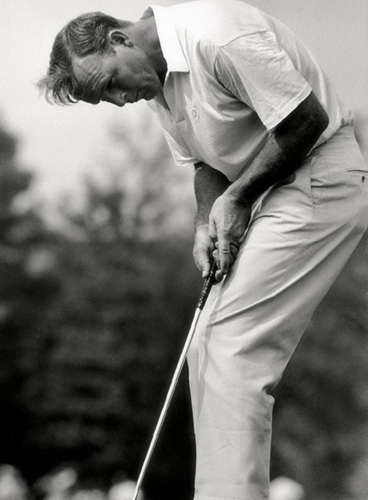
Palmer was born into the game of golf. His father, Milford Jerome Deacon Palmer, was both the greenskeeper and the head professional at Latrobe Country Club in the hills of western Pennsylvania. The city of Latrobe is forty miles east of Pittsburgh and was founded in the mid-nineteenth century largely as a railroad town. Its population topped out at about ten thousand, although by the time the census was done in 2000 the official number was 7,634. It is listed in many historical guides as the birthplace of Rolling Rock beer and Arnold Palmer.
Most people would agree that the golfer has played a more significant role in the culture of the country and the world than the beer. Arnold was the oldest of Deacon and Doris Palmers four childrentwo boys and two girls. He also spent the most time on his fathers golf course. For a large chunk of his childhood, Palmers family lived in a rented two-story house, for which they first paid fifteen dollars a month, near the 6th tee at Latrobe. Arnold was a teenager before he helped his dad build an indoor bathroom for the house.
Arnold was a golf star almost from birth. He played with other club employees whenever he could and spent just about all his free time working on his swing. He never had a picture-perfect swing by any means. In fact, most golf purists would wince at the way he followed through, contorting his body to get maximum thrust through the ball, then twirling the club at the top more in the manner of someone swishing a sword than finishing a golf swing.
The sheer effort in every swing, the violence of it, would become Palmers calling card. It was part of the reason he was so often referred to as the games greatest swashbuckler. His swing looked like that of a dueling pirate, and his fearless style on the golf course backed up the image created by his stroke.
Deacon Palmer was his older sons teacher, mentor, and taskmaster. Not that he ever had to get the boy to work at golf Arnold loved the game too much to ever think of it as work. But it was Deacon who set the standard Arnold wanted so much to live up to, who made him understand that there was more to the game than blasting the ball as far as he could and making every putt possible.
Next page
